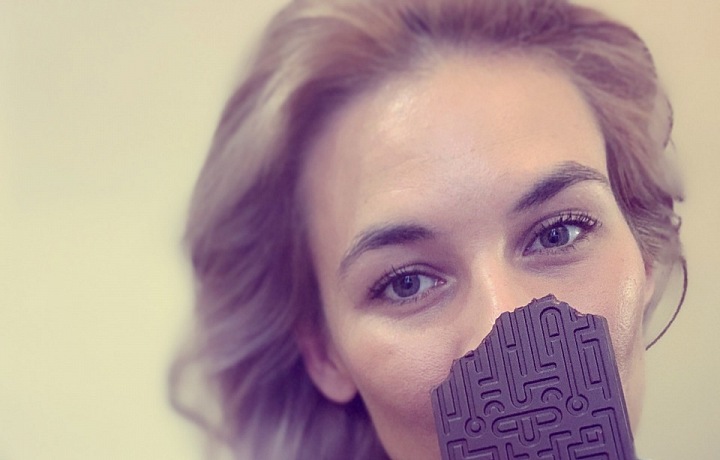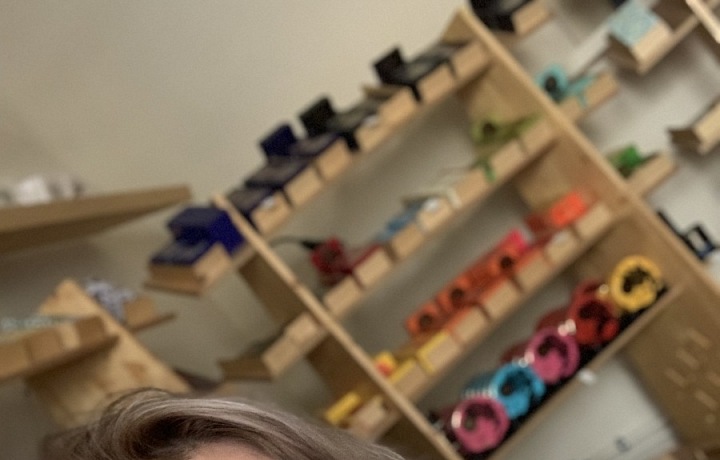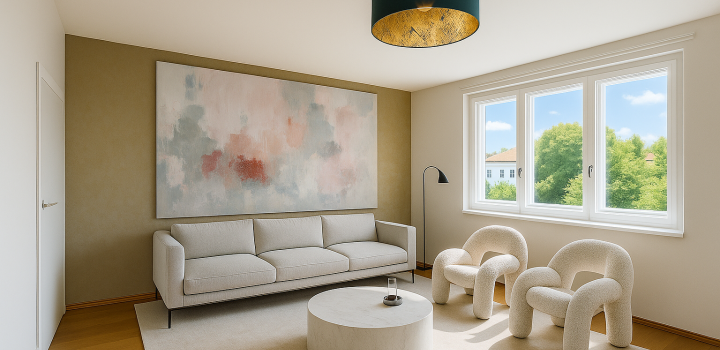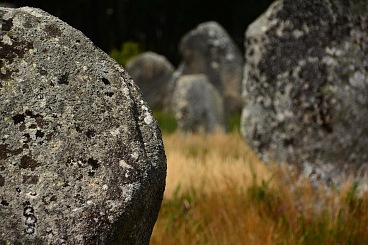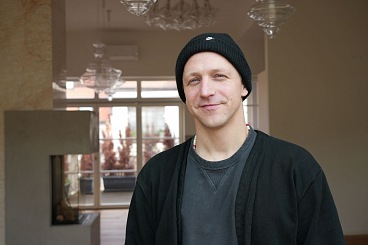Fast Confession - Šárka Robinson Pomahačová: Real chocolate won‘t make you fat! Chocolate for 8 thousand is worth it!
Chocolate, perhaps the most popular type of sweet treat, known and loved by people all around the world know. For some, this delicacy is a source of energy, for others a forbidden sin they can only reward themselves with once in a while. For Šárka Robinson Pomahačová, however, chocolate is her "daily bread". Literally. As one of the select few in the Czech Republic, she has been tasting this delicacy professionally for several years already. And she swears by it even outside working hours. It‘s not a problem for her to eat four chocolate bars a day.
How does one actually become a chocolate taster?
I admit I simply happened to walk in on this. (laughs) I studied illustration and graphics, bookbinding specialization, but I‘ve loved good food since I was a child and I have quite the sweet tooth. When I found an ad saying that a chocolate retailer was looking for someone who really liked chocolate, I didn't hesitate for a minute and immediately responded. I was accepted three minutes into the interview. (laughter)
What did you have to learn?
The most interesting thing was to discover what quality chocolate actually is like. And how it tastes. People are accustomed to sweets from regular shops, or rather sugars, so real chocolate can surprise them at the very first taste.
I had to learn everything from the very beginning. Information about cocoa trees, their cultivation, varieties, harvest and subsequent processing of beans directly on plantations. All these processes have a fundamental influence on the final taste of a chocolate bar. In fact, one never stops to learn, as novelties keep appearing on the market, just like in the world of coffee or wine.
Could anyone learn it?
Because I‘ve always been a little crazy about smells and tastes, and I‘ll smell and taste almost everything, I have the advantage of having a very good memory on both tastes and smells. That, in my opinion, is the foundation and prerequisite for being able to do my profession. Every day I try to expand my palette of tastes and smells, I think about what I‘m tasting and „store“ it in my head. When tasting chocolate, I write down my observations and then evaluate the taste profile of the chocolate.
So some kind of innate talent is definitely necessary. If someone doesn't understand scents, they probably won‘t be making perfumes for a living. A person who smells four scents and can't remember them won‘t be a good candidate for such a job either. And it‘s similar with chocolate.
When you said you liked sweets since you were a child, how come you don't look it?
Quality chocolate has the advantage that it doesn‘t make you fat. I tell it to everyone and everywhere. And nobody believes me. (laughs) Having tasted the finest chocolates, I have stopped craving almost all the other types of sweets that are commonly available in stores. Today, it never even occurs to me that I could go to a supermarket and buy a biscuit. And since I live "only" on chocolate, which contains really only the best cocoa and cane sugar, I've managed to keep my weight for quite a long time. Of course, if you eat four bars of chocolate a day, you can't just laze around on the couch at home, so I work out every now and then. (laughs)
Wait, you eat four bars a day? How long have you been doing that?
I've been on this 'dose' for four years.
And do you have a dessert sometimes, too?
Yes, I like cakes, I have a few favorite “sweet” spots in Prague. When I want to have a chocolate cake, I always ask the barista in the café or pastry shop, where they buy their cocoa or chocolate.
What‘s the most important thing about your work?
I have the advantage that I remember a lot of the fragrances and tastes, but I also keep notebooks, in which I write down all the chocolates so as to keep track of what I've already tasted. And of course I have a list of chocolates that I have yet to taste, too. I‘ve tallied up about 1,600 kinds of chocolate as of now.
Can you describe the degustation process itself?
I like to do my degustation in a quiet place devoid of disturbing elements. I can take my time to think about the samples I‘m tasting. It is not, of course, that I just gulp down a bar of chocolate and say "good/bad". During the tasting, graphs are used to record the flavors, aromatic components, the structure of the chocolate, aftertaste, and any defects of the bar generated during the production process are also considered. The shine of the chocolate, its consistency, texture, or the cracking sound when it‘s broken are important as well.
The taste of quality chocolate can contain traces of coffee, nuts, caramel, ginger, flowers, cream tones, tobacco, leather, clay, dried fruit, pastries and so on. But we are still talking about "single origin" bars, i.e. only the taste tones of the best quality cocoa, which is the bearer of these tastes. After the tasting, we discuss with the producers whether their bar is well made or whether it needs a touch up.
What kind of ingredients can be found in the cheap chocolate bars that can be purchased in supermarkets?
Almost everything is wrong there. I never buy chocolate from a regular shop anymore. Even if I had a big "cocoa deficit," I'd rather buy an apple. I'm interested in a completely different kind of chocolate than what can typically be bought in shops, namely bean-to-bar and tree-to-bar chocolate.
Large-scale factories that spew hundreds of thousands of chocolate bars a day don‘t use quality cocoa, their cocoa mostly comes from huge plantations where modified cocoa trees are grown that produce a much greater volume than ordinary trees. They yield faster, the pods are larger and the cocoa from these trees has almost no taste. Unfortunately, these new varieties are devastating the soil, sucking all nutrients out of the ground. Sadly, they often "kill" even the quality cocoa trees in their surroundings.
Then it‘s pretty easy to add vanillin to low-quality chocolate, so that it would taste like something, large amounts of sugar, preservatives, Es, vegetable fats other than cocoa butter, colorings, flavors, aromas. Personally, I don't see why I should eat something like that. All you need to make quality chocolate is a selection of cocoa beans and cane sugar.
So quality chocolate has only these two ingredients?
Exactly. And there is also milk powder in milk chocolate. These are the only three ingredients, but of course it depends very much on the quality, for example the variety of beans.
So when a parent has a child who suffers from obesity from sweets, is it mainly because it‘s the wrong kind of sweets?
Yes. It‘s definitely not true that children don‘t like quality chocolate. When it comes to children, I think the main problem is that the people around them get them addicted to sugar. It's not cocoa at all. And if you show your child what good quality chocolate is and how it tastes, Kinder Chocolate will never even cross their mind.
I always find it funny when I ask someone what kind of chocolate they like. It‘s always authomatically "bitter and of course over 80%". Maybe it's because people around me perceive me as an expert, so they think this is the only correct answer. But let‘s be honest here, almost all of us prefer milk chocolate. For me its 50/50, it depends on my mood whether I‘ll go for bitter or milk. (laughs)
I enjoy quality milk chocolate with fifty percent cocoa content just as much as the bitter kind, if not more. The myth that the more cocoa, the finer the chocolate, is complete nonsense. If you use a selection of cocoa to make a bar, you will produce the same high-quality chocolate in both milk and bitter varieties. Some kinds of milk chocolate even contain less sugar than the dark ones.
When one is used to low quality chocolate, can they tell the difference?
Yes, the difference is very prominent at the first sniff. In ordinary chocolates, sugar is the basic ingredient. Also, good chocolate should not contain vanillin or vanilla, unless it is specifically designed as vanilla chocolate. High-quality dark chocolate is not primarily bitter either.
It can be compared to the fact that until recently, no one could even imagine having a cup of coffee for eighty crowns, but nowadays it's normal. In general, we begin to pay more attention to what we eat. We eat healthier, we are interested in the ingredients that will be used to make our dinner in a restaurant. So why should we settle for low-quality chocolate?
I am very happy that there is more and more interest in quality chocolate. And people are starting to notice it more and look for specialized stores. They‘re beginning to realize that if they feel like having a chocolate, they don't have to opt for Snickers - they can enjoy a product from a professional chocolatier that contains the best ingredients. People also often think that the prices of bean-to-bar chocolate are skyhigh, but unless we go to the extreme, the price difference from bars that can be purchased in stores is not critical.
What was the most luxurious chocolate you‘ve eaten? And how much would you be willing to pay for good chocolate?
I got the best chocolate bar in the world as a gift. It is a 50g bar from Ecuador, made from the Arriba variety. In Central Europe, I am the only person to own a bar from this chocolate factory, you can find a few pieces in Harrods, London. Almost all of their production goes to the Emirates. The price of this bar is around eight thousand crowns. And just like someone likes to buy handbags, shoes or cars, I buy chocolates. (laughs)
Is it for sale?
I think it would find a buyer even on the Czech market, but it's like with the most luxurious bottle of champagne in the world - you wouldn't open it every day.
Who would buy chocolate for eight thousand?
I can imagine, for example, princesses from Morocco or Arabia, maybe a millionaire. For me it was mainly a tasting ceiling, because there is no better chocolate in the world. But they do have three more pieces in the portfolio, so I still have something to look forward to.
And how are they different?
It is about the production process and mainly about the quality of the cocoa used. Of course, you get a complete "luxury service" with this bar - from the ebony box it comes in to a book with a detailed description of what exactly you‘re holding in your hand.
My bar is made from cocoa from Piedra De Plata in Ecuador, from an original Arriba cocoa variety. The processed chocolate is then kept in oak barrels from whiskey for three years. It absorbs the characteristic aroma and taste of the beverage, wood, you can even smell light tones of tobacco and much more. The bar has a very colorful taste. And I would say it‘s not for everyone, many people would probably be surprised by its taste. You need to eat your way through to such pieces.
Fast confession:
What does chocolate mean to you in three words?
The best chocolate you've ever tasted?
What was the largest amount of chocolate you‘ve eaten in a day?
What country do you consider the best in chocolate production?
List three factors by which you know that you are addicted to chocolate.
What is the most common myth that prevails around chocolates?
What is the most demanding thing about your work?
What was the longest time you managed to go without chocolate?
If you weren't a taster, what would you do?
What annoys you about other people?
What would your dream vacation look like?
Do you consider addiction to chocolate as dangerous as an addiction to caffeine?
If you could make your own chocolate, what would it taste like?
How much chocolate should children eat? How much is too much?
What kind of chocolate do you like?
Great!




